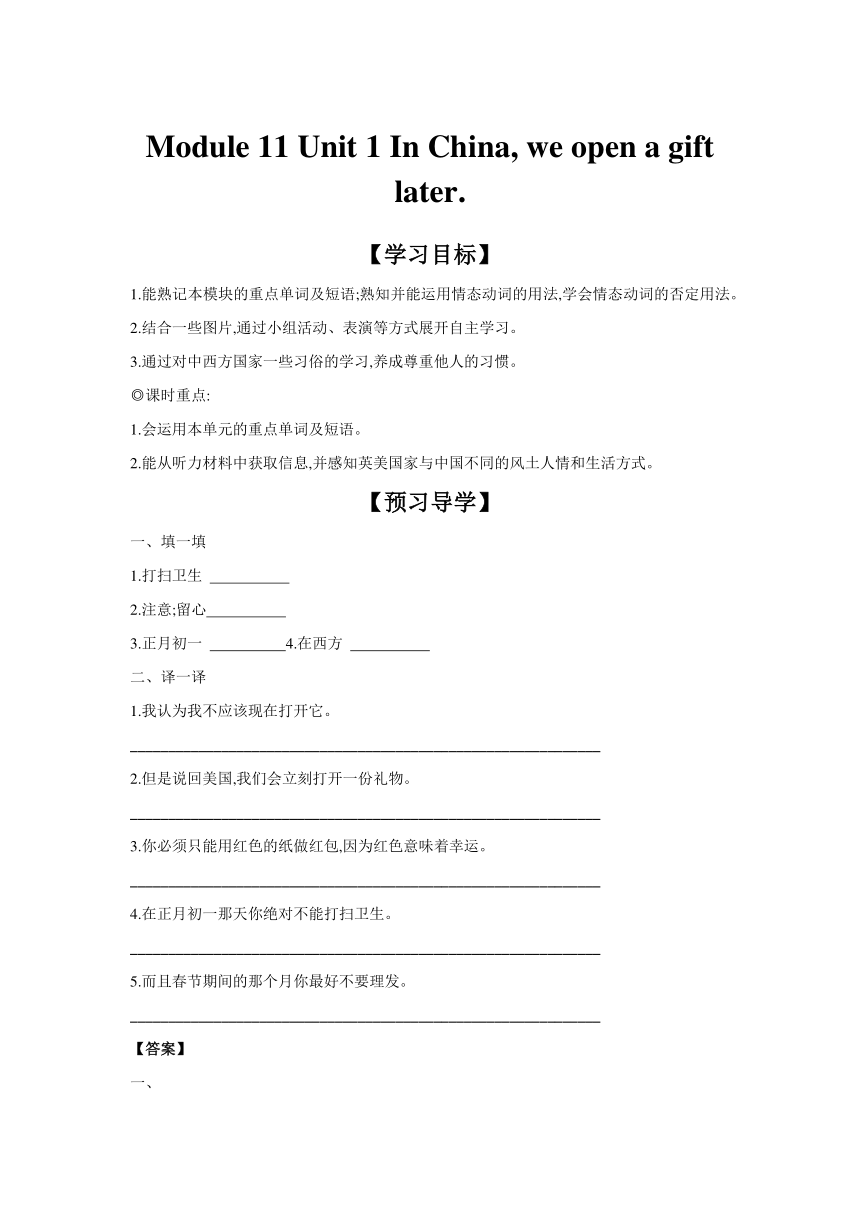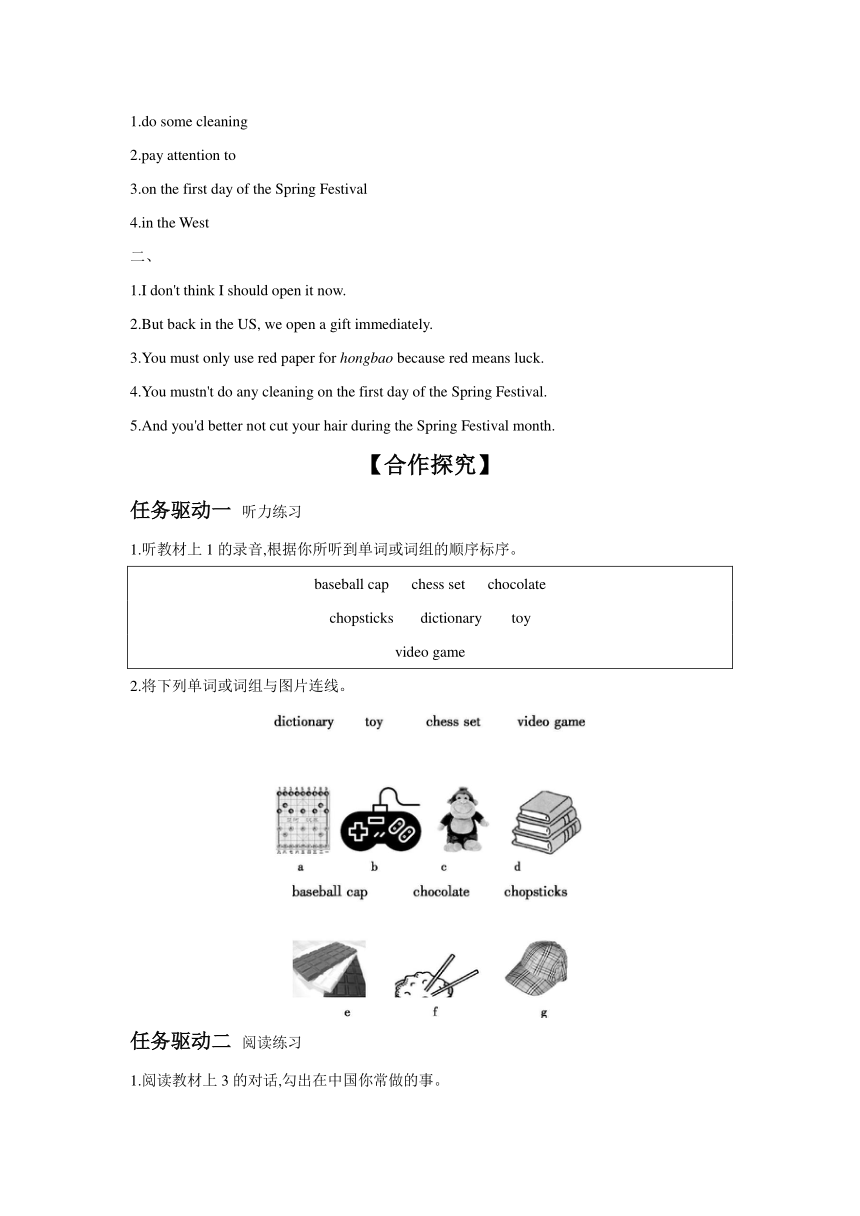Module 11 Unit 1 In China, we open a gift later. 学案初中英语外研版八年级上册(含答案)
文档属性
| 名称 | Module 11 Unit 1 In China, we open a gift later. 学案初中英语外研版八年级上册(含答案) |

|
|
| 格式 | docx | ||
| 文件大小 | 112.8KB | ||
| 资源类型 | 教案 | ||
| 版本资源 | 外研版 | ||
| 科目 | 英语 | ||
| 更新时间 | 2024-02-28 00:00:00 | ||
图片预览


文档简介
Module 11 Unit 1 In China, we open a gift later.
【学习目标】
1.能熟记本模块的重点单词及短语;熟知并能运用情态动词的用法,学会情态动词的否定用法。
2.结合一些图片,通过小组活动、表演等方式展开自主学习。
3.通过对中西方国家一些习俗的学习,养成尊重他人的习惯。
◎课时重点:
1.会运用本单元的重点单词及短语。
2.能从听力材料中获取信息,并感知英美国家与中国不同的风土人情和生活方式。
【预习导学】
一、填一填
1.打扫卫生
2.注意;留心
3.正月初一 4.在西方
二、译一译
1.我认为我不应该现在打开它。
______________________________________________________________
2.但是说回美国,我们会立刻打开一份礼物。
______________________________________________________________
3.你必须只能用红色的纸做红包,因为红色意味着幸运。
______________________________________________________________
4.在正月初一那天你绝对不能打扫卫生。
______________________________________________________________
5.而且春节期间的那个月你最好不要理发。
______________________________________________________________
【答案】
一、
1.do some cleaning
2.pay attention to
3.on the first day of the Spring Festival
4.in the West
二、
1.I don't think I should open it now.
2.But back in the US, we open a gift immediately.
3.You must only use red paper for hongbao because red means luck.
4.You mustn't do any cleaning on the first day of the Spring Festival.
5.And you'd better not cut your hair during the Spring Festival month.
【合作探究】
任务驱动一 听力练习
1.听教材上1的录音,根据你所听到单词或词组的顺序标序。
baseball cap chess set chocolate
chopsticks dictionary toy
video game
2.将下列单词或词组与图片连线。
任务驱动二 阅读练习
1.阅读教材上3的对话,勾出在中国你常做的事。
(1)Open a present immediately when you receive it.
(2)Accept a present with both hands
(3)Use red paper for hongbao.
(4)Do cleaning on the first day of the Spring Festival.
(5)Break something during the Spring Festival.
(6)Have your hair cut during the Spring Festival month.
2.用方框中所给的词完成短文。
accept attention surprise taste traditions
It is always a(n) (1) to receive gifts from family members and friends. In China, we usually (2) a gift with both hands and open it later. But in the West, people usually do not pay much (3) to that. During the Spring Festival, there are many (4) . For example, people in the north of China eat lots of jiaozi. They (5) great.
任务驱动三 写作练习
在小组里讨论,在下面的情况下你必须做什么,不能做什么。
Must Mustn't / Can't
At school put up your hand before you talk
At the dining table talk with food in your mouth
【答案】
任务驱动一
2.
任务驱动二
1.(2)√ (3)√
2.(1)surprise (2)accept (3)attention
(4)traditions (5)taste
【知识超市】
●In China, you accept a gift with both hands. 在中国,你们用双手接受一份礼物。
accept 是动词,意为“接受”。
1.常作及物动词,后接名词或代词;
2.同义词辨析:accept强调主观上接受;receive强调客观上收到。例如:
I've received a gift from him, but I'm not going to accept it.我收到了他送的礼物,但是我不准备接受。
做一做:单项选择。
( )1.I've just a letter from my parents.
A.received
B.accepted
C.bought
D.written
( )2.Tony my present but did not it.
A.received; accepted
B.received; accept
C.accepted; receive
D.accepted; received
【答案】
1~2 AB
●You must only use red paper for hongbao because red means luck. 你必须只能用红色的纸做红包,因为红色意味着幸运。
1.表示必须要做的事,意为“必须”。否定式为mustn't,意为“不应该;不允许;禁止”等。在对带有must的一般疑问句作否定回答时,不用mustn't, 而用needn't或don't have to。例如:
—Must I finish the housework before seven o'clock
—七点以前我必须完成家庭作业吗
—No, you needn't. / Yes, you must.
——不,你不必。/是的,你必须。
2.表示推测,暗含很大的可能性,意为“一定”,只用于肯定句中。
做一做:单项选择。
( )1.—You be happy with the strong public support you've received.
—Yes, you're right. I'm really excited.
A.may
B.can
C.must
D.need
( )2.—Must we wear our school uniform this afternoon
—No, you . All of us will go on an outing.
A.mustn't
B.can't
C.needn't
D.couldn't
【答案】
1~2 CC
【学习目标】
1.能熟记本模块的重点单词及短语;熟知并能运用情态动词的用法,学会情态动词的否定用法。
2.结合一些图片,通过小组活动、表演等方式展开自主学习。
3.通过对中西方国家一些习俗的学习,养成尊重他人的习惯。
◎课时重点:
1.会运用本单元的重点单词及短语。
2.能从听力材料中获取信息,并感知英美国家与中国不同的风土人情和生活方式。
【预习导学】
一、填一填
1.打扫卫生
2.注意;留心
3.正月初一 4.在西方
二、译一译
1.我认为我不应该现在打开它。
______________________________________________________________
2.但是说回美国,我们会立刻打开一份礼物。
______________________________________________________________
3.你必须只能用红色的纸做红包,因为红色意味着幸运。
______________________________________________________________
4.在正月初一那天你绝对不能打扫卫生。
______________________________________________________________
5.而且春节期间的那个月你最好不要理发。
______________________________________________________________
【答案】
一、
1.do some cleaning
2.pay attention to
3.on the first day of the Spring Festival
4.in the West
二、
1.I don't think I should open it now.
2.But back in the US, we open a gift immediately.
3.You must only use red paper for hongbao because red means luck.
4.You mustn't do any cleaning on the first day of the Spring Festival.
5.And you'd better not cut your hair during the Spring Festival month.
【合作探究】
任务驱动一 听力练习
1.听教材上1的录音,根据你所听到单词或词组的顺序标序。
baseball cap chess set chocolate
chopsticks dictionary toy
video game
2.将下列单词或词组与图片连线。
任务驱动二 阅读练习
1.阅读教材上3的对话,勾出在中国你常做的事。
(1)Open a present immediately when you receive it.
(2)Accept a present with both hands
(3)Use red paper for hongbao.
(4)Do cleaning on the first day of the Spring Festival.
(5)Break something during the Spring Festival.
(6)Have your hair cut during the Spring Festival month.
2.用方框中所给的词完成短文。
accept attention surprise taste traditions
It is always a(n) (1) to receive gifts from family members and friends. In China, we usually (2) a gift with both hands and open it later. But in the West, people usually do not pay much (3) to that. During the Spring Festival, there are many (4) . For example, people in the north of China eat lots of jiaozi. They (5) great.
任务驱动三 写作练习
在小组里讨论,在下面的情况下你必须做什么,不能做什么。
Must Mustn't / Can't
At school put up your hand before you talk
At the dining table talk with food in your mouth
【答案】
任务驱动一
2.
任务驱动二
1.(2)√ (3)√
2.(1)surprise (2)accept (3)attention
(4)traditions (5)taste
【知识超市】
●In China, you accept a gift with both hands. 在中国,你们用双手接受一份礼物。
accept 是动词,意为“接受”。
1.常作及物动词,后接名词或代词;
2.同义词辨析:accept强调主观上接受;receive强调客观上收到。例如:
I've received a gift from him, but I'm not going to accept it.我收到了他送的礼物,但是我不准备接受。
做一做:单项选择。
( )1.I've just a letter from my parents.
A.received
B.accepted
C.bought
D.written
( )2.Tony my present but did not it.
A.received; accepted
B.received; accept
C.accepted; receive
D.accepted; received
【答案】
1~2 AB
●You must only use red paper for hongbao because red means luck. 你必须只能用红色的纸做红包,因为红色意味着幸运。
1.表示必须要做的事,意为“必须”。否定式为mustn't,意为“不应该;不允许;禁止”等。在对带有must的一般疑问句作否定回答时,不用mustn't, 而用needn't或don't have to。例如:
—Must I finish the housework before seven o'clock
—七点以前我必须完成家庭作业吗
—No, you needn't. / Yes, you must.
——不,你不必。/是的,你必须。
2.表示推测,暗含很大的可能性,意为“一定”,只用于肯定句中。
做一做:单项选择。
( )1.—You be happy with the strong public support you've received.
—Yes, you're right. I'm really excited.
A.may
B.can
C.must
D.need
( )2.—Must we wear our school uniform this afternoon
—No, you . All of us will go on an outing.
A.mustn't
B.can't
C.needn't
D.couldn't
【答案】
1~2 CC
同课章节目录
- Module 1 How to learn English
- Unit 1 Let's try to speak English as much as possi
- Unit 2 You should smile at her.
- Unit 3 Language in use .
- Module 2 My home town and my country
- Unit 1 It's taller than many other buildings.
- Unit 2 Cambridge is a beautiful city in the east o
- Unit 3 Language in use .
- Module 3 Sports.
- Unit 1 Nothing is more exciting than playing tenni
- Unit 2 This year we training more carefully.
- Unit 3 Language in use .
- Module 4 Planes, ships and trains .
- Unit 1 He lives the farthest from school.
- Unit 2 What is the best way to travel.
- Unit 3 Language in use .
- Module 5 Lao She Teahouse.
- Unit 1 I wanted to see the Beijing Opera.
- Unit 2 It descibes the changes in Chinese society.
- Unit 3 Language in use .
- Module 6 Animals in danger.
- Unit 1 It allows people to get closer to them .
- Unit 2 The WWF is working hard to save them all.
- Unit 3 Language in use .
- Revision module A
- Module 7 A famous story
- Unit 1 Alice was sitting with her sister by the ri
- Unit 2 She was thinking about her cat.
- Unit 3 Language in use .
- Module 8 Accidents
- Unit 1 While the car were changing to red, a car s
- Unit 2 I was trying to pick it up when it bite me
- Unit 3 Language in use .
- Module 9 Population
- Unit 1 The population of China is about 1.37 billi
- Unit 2 Arnwick was a city with 200,000 people.
- Unit 3 Language in use .
- Module 10 The weathe
- Unit 1 It might snow.
- Unit 2 The weather is fine all year round.
- Unit 3 Language in use .
- Module 11 Way of life
- Unit 1 In China ,we open a gift later.
- Unit 2 In England, you usually drink tea with milk
- Unit 3 Language in use .
- Module 12 Help
- Unit 1 What should we do before help arrives?
- Unit 2 Stay away from windows and heavy furniture.
- Unit 3 Language in use .
- Revision module B
